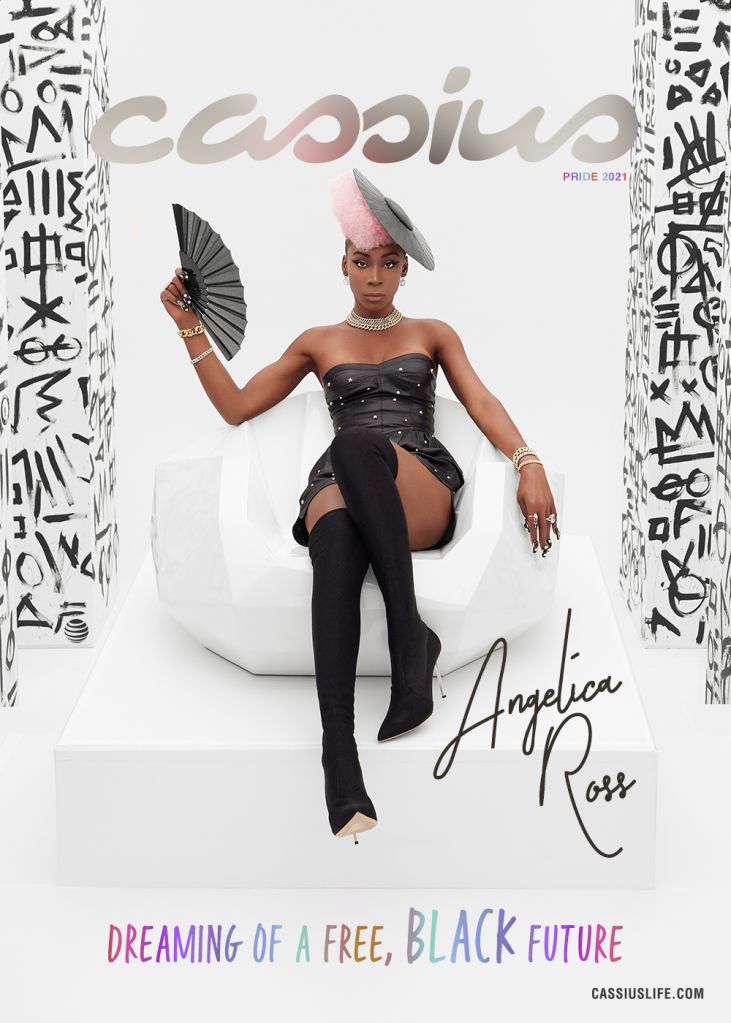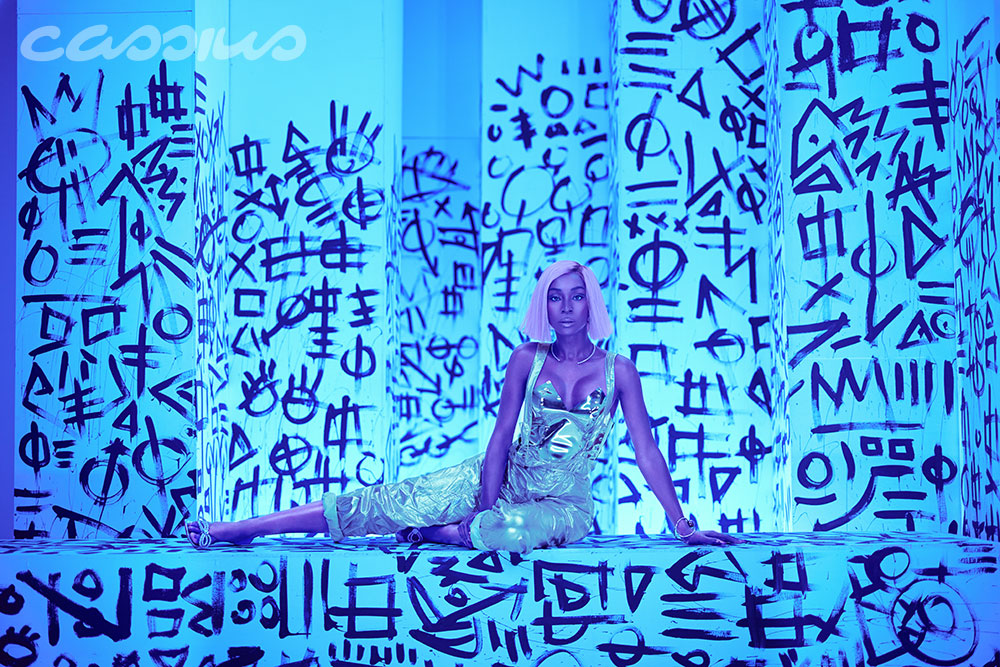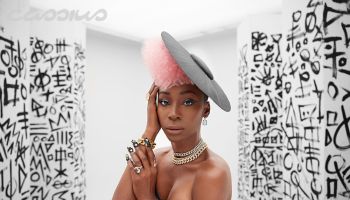
Source: @JDtheCombo with thejamesbarnes.com / JD Barnes
It’s an early Thursday morning in late May and I am on a video conference call virtually sitting alongside my friend, Angelica Ross, the actress, business leader, and unbossed champion for transformative justice. We are both zooming in from Los Angeles, which is currently where Angelica is living and filming as a series regular on season ten of Ryan Murphy’s “American Horror Story.”
Before I begin asking questions, I think about how far Angelica has journeyed. I think about the way she is unafraid to use her voice to call out injustice and offer possibilities for how we might reimagine community and accountability. Shit, I think about the many times that she has schooled me—like several weeks back when she was at my house talking about the stunning differences between cis and transgender people’s access to power in Hollywood. I think about the passionate work that she does outside of the camera’s view, the deep-hearted and selfless work that she has been engaged in for years in community with Black trans women and Black people, in general—even when some cisgender Black folks showed their assess and their disdain for Black trans women.
In Toni Morrison’s A Song Of Solomon, one of the most indelible lines reads, “Wanna fly, you got to give up the shit that weighs you down.” That line consistently conjures images of Angelica for me, because she wants us to be free from all that might turn our freedom dreams into someone else’s nightmare. So, yes, as I prepare to interview Angelica Ross, the superstar, I think about how she has manifested in the face of rampant anti-Blackness and transmisogyny. Intertwined with that, though, I think about my friend, the human person, whose Black love knows no bounds as our conversation below illuminates.
Darnell Moore: How are you feeling? I know that you’re deeply, deeply connected to and always thinking about spirit so what lessons have you learned as you maneuver through this pandemic?
Angelica Ross: I am in a place where I am well with everything. The good, the bad, the challenges, the stillness. What I have learned so much from the pandemic is how important it is to be in the flow. Like the wind doesn’t always blow hard and, likewise, I don’t have to go hard all the time. I’m now enjoying the downtime as much as I can.
DM: I am glad that you are. You must stop to breathe, too. But here we are, talking as we approach June, which is LGBT Pride month. We know that Pride month can be a celebratory and complicated time for Black queer, trans, and non-binary people. You’ve said as much over the years. Can you talk about that complexity?
Everything about who we are is political.
AR: When it comes to Pride it’s important to me that we finally understand that Black and Brown queer and trans people have been modeling a form of pride that is the key to Black liberation. And, obviously, we can’t be free until Black trans women are free. I work so hard to create real freedom for others, but I also try not to overlook the importance of experiencing freedom myself. Still, I’ve changed my relationship with Black men from one of fear to radical love even in the face of statistics, violence, patriarchy and oppression. I still tell Black cis men, “I love you.” I still say, “I understand where you’re coming from, but we have to evolve from that space.” It’s a place that I feel like, again, only Black trans and queer people can lead. When folks say “we’re rooting for everybody Black” I think that Black queer and trans people are the ones who are going to really exemplify that.
DM: You ‘bout to have me leap out this chair, because I always say that when Black queer, trans and non-binary folk are out here fighting for Black liberation, we’re fighting for all of us. Everybody is included in that vision.
AR:: How they don’t understand that is beyond me.
DM: That’s one of the things that I love about you. You’re unafraid. You will critique white supremacy. You will critique whiteness. You will critique patriarchy, cultures of rape, sexism, misogyny, but you will also turn to another Black person with love and be like, “Fam, listen, you got to move away from this trans antagonism.”
AR: Yes, that ain’t it.
DM: Talk about that, because that is an act of love. Calling in or sometimes calling out is an act of love.
AR: Yes. I mean, a big nod to brother James Baldwin who talked about his love for America and the fact that because he loved America so much he felt that he had the right to critique it. That’s how I feel about my Black brothers, sisters and niblings. I love y’all so much. I love you so much that I’m willing to give the critique that I know will help you grow, that I know will help free you or heal you, something that I know you need to hear, but nobody else will say, or may have the courage to say. At the same time, I’ve learned how to do that while protecting myself because offering that love when people are unconscious can be dangerous. I have to always be fully aware. There’s an acronym that I use that one of my Buddhist friends shared with me and it is N.O.W., which stands for No Opportunity Wasted. What that means is I may not be able to save the whole world, or I may not be able to get another person to fully understand a concept, but I can plant a seed. I can move the needle forward.
Check out our IG Live convo with Angelica Ross hosted by Bossip’s Janee Bolden.
DM: You’re one of the most prolific, honest, politically Black, politically trans, politically feminist celebrity voices out here. Who were your teachers and why is it important for you to use your platform on behalf of your people, even if that may come with consequences?
AR: Listen, there have been a lot of Black trans women who have radicalized me. Lourdes Ashley Hunter comes to mind.
My freedom dream is for us to globally prioritize restorative justice.
DM: Shout out to Lourdes.
AR: Yes, shout out to Lourdes. I love that she’s honest like I’m honest. Even when we have disagreed with each other, it’s been very honest. She would push me so hard on some of my comforts. She would point out to me just how to look at things a little bit more closely and how to not underestimate whiteness and how to identify inter-community issues. I’ve also learned much from doing work—like actually pulling up my sleeves and doing the work. While it’s not been easy and while it looked like I might’ve been in a position of privilege or benefiting from things, I have learned no matter the situation to be radical enough to understand that the personal is political. Everything about who we are is political. If you don’t understand that, you’ll be in a situation where you are shocked that they’re now trying to create a policy around some part of your identity or experience.

Source: JD Barnes / Talent: @AngelicaRoss Photographer: @JDtheCombo with thejamesbarnes.com Fashion Stylist & Creative Director: @BrandonMGarr Fashion Stylist: @TaylorOrear Makeup: @YolondaFrederick Hair: @KiyahWright1 Image Editor: @Daniele.Iachella with @crowdMGMT Nail
DM: To borrow from the scholar, Robin D. G. Kelly, what is your “freedom dream”? What does a black loving, liberatory future for all of us look like in your big imagination?
AR: My freedom dream is for us to globally prioritize restorative justice. What that looks like is the whole concept of museums changing. I don’t want to hear and look at stories of theft and see all these artifacts that belong to someone else, to other cultures, be owned by folks that colonized them, or what have you. For me, I want to see us globally return to the Native American and indigenous understandings of land: we don’t own this land. What freedom looks like is being free to both take what you need from the land, but also to know that you have the ability to contribute to an environment where all people, whatever their background, can contribute so that we all get to a place of restoration. That’s what my freedom dream is: a world restored where everybody and everything is able to be valued.
DM: Amen to that. Last fun and random question. Let’s imagine that you were invited on stage to give remarks to a packed crowd at a Future concert in ATL, and it’s June, Pride month, what would your 60-second message to that crowd be?
AR: Okay. My message would be, “We free y’all, but we have to be vigilant in order to stay free.” We must take action at every injustice. We have learned that we don’t need to be policed when we are committed to protect each other. We don’t need prisons because we’ve learned how to truly use the tool of accountability. I would say that music was that first place for me, honestly, where I experienced the freedom in my voice, in my body, the way that I move, and that music is life, and that life is music. We should be free to make music however, we should feel free to make music that we love. I would say to that audience, “Let’s love, and let’s, I don’t know, let’s love and let’s dance and let’s get free.”

















